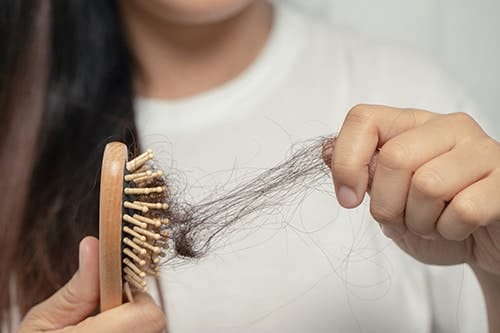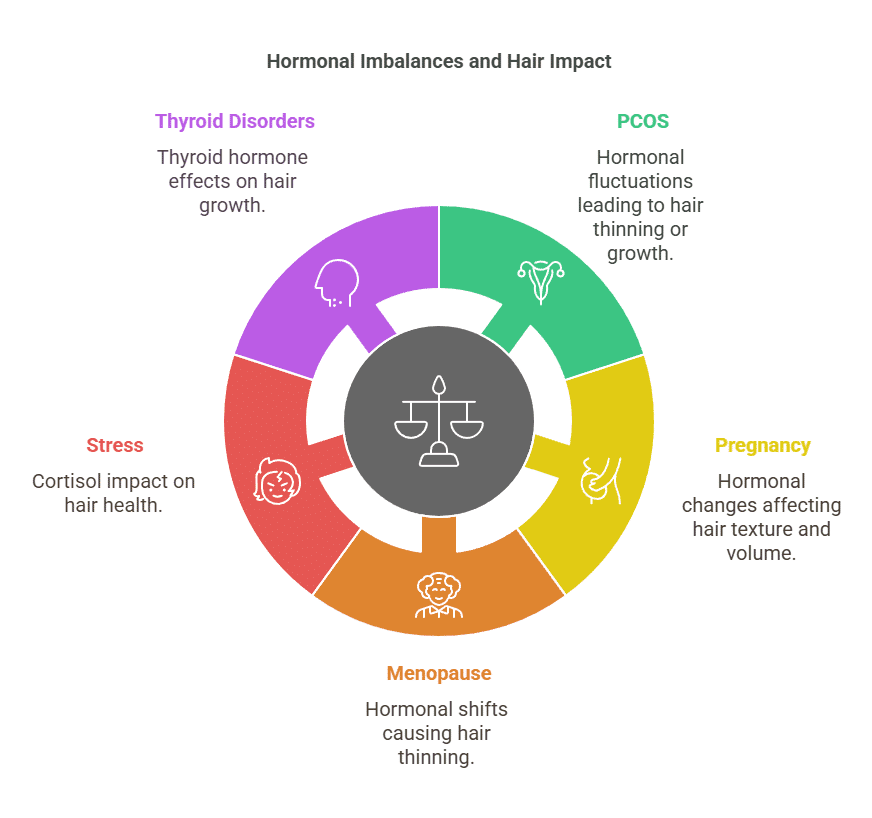Blog
Which Hormone Causes Hair Loss in Females? The Shocking Science Behind Your Strands
Have you been finding more hair in your brush lately? Or maybe you’ve noticed your part looking wider than usual? If you’re like many women dealing with hair loss, you might be wondering what’s really going on and which Hormone causes Hair Loss. I know how frustrating it can be to watch your hair gradually thin without understanding why.
Table of Contents
The Hidden Culprit Behind Female Hair Loss
Let’s cut right to the chase – the main hormone responsible for hair loss in women is DHT (Dihydrotestosterone). According to UCLA Health, while DHT is indeed derived from testosterone, it plays a significant role in female hair loss too. Think of DHT as that unwanted guest who shows up at your scalp’s party and starts causing trouble with your hair follicles.
How DHT Affects Your Hair
Picture this: you’re going about your day, and suddenly your body decides to convert some of your testosterone into DHT using an enzyme called 5-alpha reductase. As explained by The Riegel Center, it’s like your body’s running a tiny chemical factory, but sometimes it produces a bit too much of the wrong thing. When DHT levels get out of balance, it can start shrinking your hair follicles, making your hair thinner and more brittle over time.
Beyond DHT: Other Hormonal Players in Hair Loss
While DHT might be the main troublemaker, it’s not working alone. Several other hormones can affect your hair growth:
Estrogen: Your Hair’s Best Friend
Remember how your hair looked amazing during pregnancy? That’s estrogen at work! When estrogen levels drop, especially during menopause or certain medical treatments, your hair can start thinning. It’s like losing your hair’s protective shield.
Cortisol: The Stress Connection
I’ve seen it countless times – a stressful period at work or home, and suddenly you’re shedding more hair than usual. That’s cortisol, your body’s stress hormone, throwing your hair cycle into chaos. It’s like your body’s saying, “We’ve got bigger fish to fry than growing hair right now!”

Thyroid Hormones: The Master Controllers
Your thyroid hormones (T3 and T4) are like the conductors of your body’s orchestra. When they’re out of tune – whether too high or too low – your hair growth can suffer. An underactive thyroid can make your hair dry and brittle, while an overactive one can lead to unusual shedding.
The Role of Hormonal Imbalances
Think of your hormones like a delicate balance scale. When one side gets too heavy or light, it affects everything – including your hair. Recent research published in the National Library of Medicine has highlighted how various hormonal imbalances can affect hair growth. Common conditions that can tip this balance include:
- PCOS (Polycystic Ovary Syndrome)
- Pregnancy and postpartum changes
- Menopause
- Stress
- Thyroid disorders

Natural Ways to Combat Hormonal Hair Loss
After years of research and personal experience, I’ve found several effective ways to fight back against hormonal hair loss:
1. Lifestyle Changes
- Stress management (yes, those meditation apps might actually help your hair!)
- Regular exercise to balance hormones naturally
- Getting enough sleep (your hair grows while you rest)
2. Diet Modifications
- Including hormone-balancing foods like:
- Healthy fats (avocados, olive oil)
- Lean proteins
- Green leafy vegetables
- Reducing sugar and processed foods
3. Natural DHT Blockers
Nature has provided some powerful allies in the fight against DHT:
- Saw Palmetto
- Pumpkin Seed Oil
- Green Tea
- Rosemary Oil
For a deeper dive into how rosemary oil fights hair loss, check out this article next!
When to Seek Professional Help
While natural remedies can be effective, sometimes you need expert guidance. Consider consulting a healthcare provider if you notice:
- Sudden, severe hair loss
- Patches of complete hair loss
- Other concerning symptoms along with hair loss
Where are you noticing the most hair loss?
Moving Forward: Your Action Plan
Remember, dealing with hormonal hair loss isn’t just about treating symptoms – it’s about understanding and addressing the root cause. Here’s what you can do starting today:
- Track your hair loss patterns
- Note any recent lifestyle or health changes
- Start implementing some natural remedies
- Consider getting your hormone levels checked
Final Thoughts
Now you know which hormone causes hair loss in women. Living with hormonal hair loss can be challenging, but understanding what’s happening is the first step toward taking control. Remember, you’re not alone in this journey – millions of women face similar challenges. With the right knowledge and approach, you can work toward healthier hair and restored confidence.
[Have questions about your hair loss journey? Leave a comment below, and let’s support each other through this process!]
[Note: This article is for informational purposes only and should not replace professional medical advice. Always consult with a healthcare provider before starting any new treatment regimen.]


